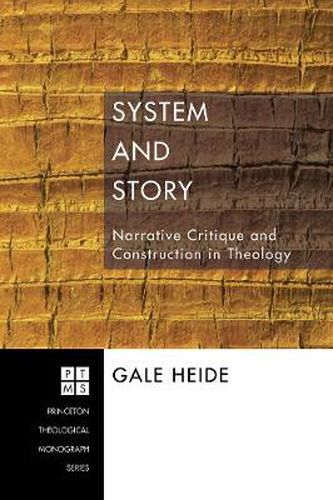Readings Newsletter
Become a Readings Member to make your shopping experience even easier.
Sign in or sign up for free!
You’re not far away from qualifying for FREE standard shipping within Australia
You’ve qualified for FREE standard shipping within Australia
The cart is loading…






This title is printed to order. This book may have been self-published. If so, we cannot guarantee the quality of the content. In the main most books will have gone through the editing process however some may not. We therefore suggest that you be aware of this before ordering this book. If in doubt check either the author or publisher’s details as we are unable to accept any returns unless they are faulty. Please contact us if you have any questions.
System and Story is intended to develop a means for bridging the gap between critics of system and those who may find value in doing systematics from a Biblically oriented context. Narrative theologians have rightly identified and critiqued the development of system in academic theology. Unfortunately, they have not identified the ways in which systematic elements have always played a role in theological knowledge. This study demonstrates the inherent systematic tendencies that still exist in narrative approaches to theology, while at the same time acknowledging the appropriateness of aspects of the narrative critique of system. The reaction against Enlightenment modernism is examined from the perspective of the heightened role of system in religious epistemology. The work of Stanley Hauerwas serves to carry much of the conversation regarding the critique of system and a narrative alternative as it is discovered in communal formation. After summarizing Hauerwas’ theology, if such a thing is possible, the final chapters explore the ecclesiological concerns of narrative theologians according to a more systematic rendering of pneumatology. A Biblical rendering of pneumatology from the perspective of the Spirit’s role in ecclesiology allows for a modest (i.e., pre-modern) systematic presentation commensurate with narrative communal formation. Thus, the narrative attempt to once again do theology for the church is seen as compatible with a Scriptural (i.e., modestly systematic) theology of the Spirit.
$9.00 standard shipping within Australia
FREE standard shipping within Australia for orders over $100.00
Express & International shipping calculated at checkout
This title is printed to order. This book may have been self-published. If so, we cannot guarantee the quality of the content. In the main most books will have gone through the editing process however some may not. We therefore suggest that you be aware of this before ordering this book. If in doubt check either the author or publisher’s details as we are unable to accept any returns unless they are faulty. Please contact us if you have any questions.
System and Story is intended to develop a means for bridging the gap between critics of system and those who may find value in doing systematics from a Biblically oriented context. Narrative theologians have rightly identified and critiqued the development of system in academic theology. Unfortunately, they have not identified the ways in which systematic elements have always played a role in theological knowledge. This study demonstrates the inherent systematic tendencies that still exist in narrative approaches to theology, while at the same time acknowledging the appropriateness of aspects of the narrative critique of system. The reaction against Enlightenment modernism is examined from the perspective of the heightened role of system in religious epistemology. The work of Stanley Hauerwas serves to carry much of the conversation regarding the critique of system and a narrative alternative as it is discovered in communal formation. After summarizing Hauerwas’ theology, if such a thing is possible, the final chapters explore the ecclesiological concerns of narrative theologians according to a more systematic rendering of pneumatology. A Biblical rendering of pneumatology from the perspective of the Spirit’s role in ecclesiology allows for a modest (i.e., pre-modern) systematic presentation commensurate with narrative communal formation. Thus, the narrative attempt to once again do theology for the church is seen as compatible with a Scriptural (i.e., modestly systematic) theology of the Spirit.